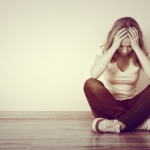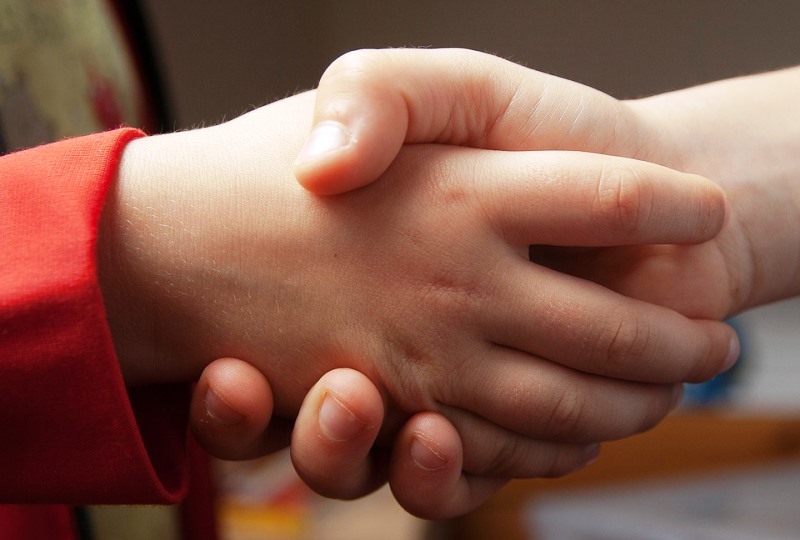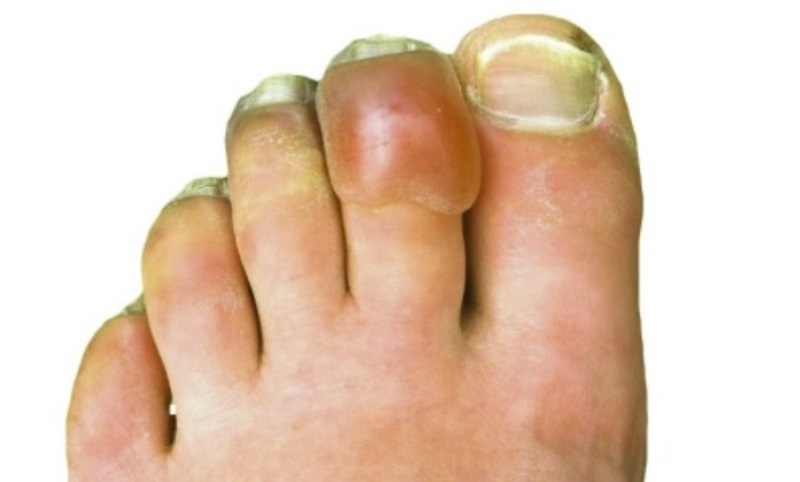Today, we will be discussing the home remedies for anxiety. So let’s start with the most common symptoms that are signals of anxiety in a person.
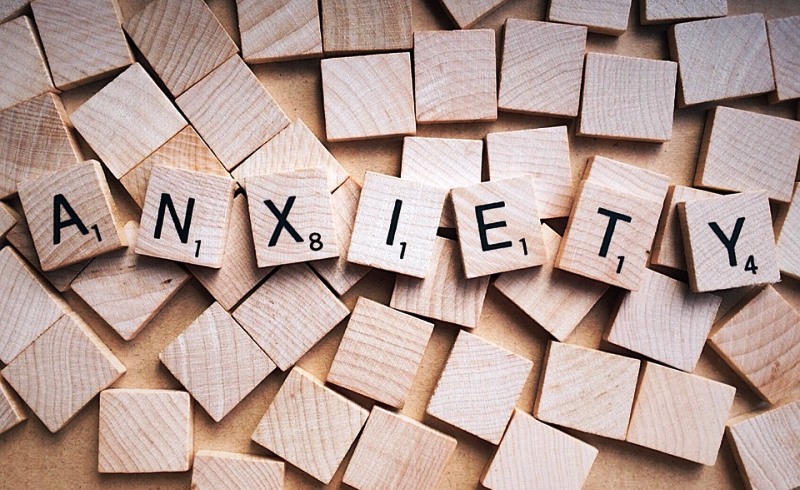
Image source: Google, copyright-free image under Creative Commons License
Suggested read: 8 easy-peasy ways to de-stress when anxiety attacks
Signs of anxiety
The common symptoms of anxiety are,
- Feeling tense all the time
- Sensing an impending danger
- Worrying about things that have not happened
- Increased heart rate
- Hyperventilation or breathing too fast
- Profusely sweating
- Feeling tired most of the time
- Feeling of weakness
- Difficulty living in the present
- Difficulty in concentrating
- Insomnia
- Gastrointestinal problems
- Incessant worry
- Avoiding any kind of change as that triggers anxiety
Types of anxiety
There are several types of anxiety. Let us discuss a few:
- Agoraphobia
In this type of anxiety, people places and situations because they fear these will cause panic in them. They feel trapped or embarrassed most of the time.
- Anxiety caused by a medical condition
The symptoms of anxiety caused by a serious physical health problem include intense panic.
- Generalized anxiety condition
Constant state of worry about things mundane and routine. The panic is out of proportion and is very tough to control. This disorder also makes you feel weak, physically. It usually is a symptom of depression.
- Panic disorder
This includes recurring periods of intense anxiety, where within minutes the terror reaches a peak. The symptoms of this disorder include shortness of breath, chest pain, heart palpitations among others.
- Selective mutism
This is usually seen in children. In selective mutism, kids fail to speak in a particular situation though when with people they know, for example, people at home, they are likely to be very talkative.
- Separation anxiety condition
This again is a childhood disorder, where anxiety takes a tone of the child’s psychological development. It is associated with the child’s separation from his or her parents or guardians.
- Social phobia
The social anxiety includes extremely high level of fear of embarrassment and anxiety related to that, which makes the person avoid meeting new people or going out. The person suffering from it is too self-conscious and always concerned about whether other people are judging him or her negatively.
- Particular phobias
This is caused when the person suffering from it is exposed to a situation that they would rather avoid. It can also lead to panic attacks.
- Anxiety caused by substance abuse
This condition develops in a person who abuses drugs or is taking medicines for a particular ailment. The withdrawal from the pills can cause a panic attack.
When should one see a doctor
According to the Mayo Clinic, one should see the doctor if and when,
“You feel like you’re worrying too much and it’s interfering with your work, relationships or other parts of your life. Your fear, worry or anxiety is upsetting to you and difficult to control. You feel depressed, have trouble with alcohol or drug use, or have other mental health concerns along with anxiety. You think your anxiety could be linked to a physical health problem. You have suicidal thoughts or behaviors — if this is the case, seek emergency treatment immediately.”
Causes of anxiety
What causes anxiety is not fully known, but usually traumatic experiences in life can act as triggers for many people. Anxiety is also inherited.
Medical problems associated with anxiety
Here are a few medical conditions that are linked with the disorder.
- Heart disease
- Blood sugar
- Hyperthyroidism
- COPD or Chronic Obstructive Pulmonary Disease
- Asthma
- Drug abuse
- Withdrawal symptoms
- Irritable bowel syndrome
- Tumors producing “fight-or-flight” hormones
Complications related to anxiety
Anxiety, apart from causing you to worry all the time, can also worsen other conditions that you might have. For example,
- Mental disorders such as depression
- Insomnia
- Substance abuse
- Chronic headaches
- Digestive problems
- Isolation from society
- Suicidal tendencies
Suggested read: 10 natural remedies that relieve stress and improve quality of life
Here are 10 home remedies that can help you deal with your acute anxiety better:
Home remedies for anxiety
1. Chamomile tea

Image source: Google, copyright-free image under Creative Commons License
Whenever you feel anxious about something drink a cup of chamomile tea.
Chamomile contains two very important chemicals, namely apigenin and luteolin. These promote relaxation.
According to a study conducted by the University of Pennsylvania Medical Center, people who suffer from generalized anxiety have felt way better after drinking 3 cups of chamomile tea a day, for 8 weeks.
2. Omega-3s

Image source: Google, copyright-free image under Creative Commons License
To help cope with anxiety better take 1 to 3 grams of omega-3s every day.
The omega-3 fatty acids help with anxiety disorders because they ease the symptoms and lower stress levels. Omega 3-s contain adrenaline which lifts up your mood. It also contains cortisol which induces happy feelings.
Tuna and salmon can be two very good sourced of omega-3 fatty acid. You can also munch on some walnuts and flax seeds to increase your Omega-3 levels.
According to a study conducted in Israel, students who were give supplements containing fish oil showed fewer symptoms of anxiety than those you did not. The former students developed a healthier food and sleeping habit which was an indicator of reduced anxiety levels.
3. Lavender

Image source: Pixabay, under Creative Commons License
According to a study, massaging your body with lavender oil can lessen your anxiety and make you more upbeat.
Lavender massage lowers our systolic pressure which means it lowers the stress level.
To try this remedy, while drawing yourself a bath, add a few drops of lavender essential oil in the water. You can also spray a few drops on your pillow before catching 40 winks.
4. L-lysine
An amino acid, L-lysine is among the building blocks of the brain’s neurotransmitters.
According to studies, taking supplements that contain L-lysine lowered the occurrence of a panic attack among people suffering from anxiety. The amino acid also keeps a check on stress levels.
You can find L-lysine in meat, fish and beans. You may also take it as a supplement, but do consult a doctor for the correct dosage and do not self-medicate.
5. Natural sunlight

Image source: Pixabay, under Creative Commons License
One of the best ways to increase the Vitamin D in your body is to take a walk early in the morning. A rise in Vitamin-D levels lowers the stress levels. And so exposing yourself to the early rays of the morning sun can help deal with your anxiety.
According to a Japanese study, people who took a walk in nature for at least 20 minutes every morning had lower levels of stress than people who walked in the town area.
6. Exercise
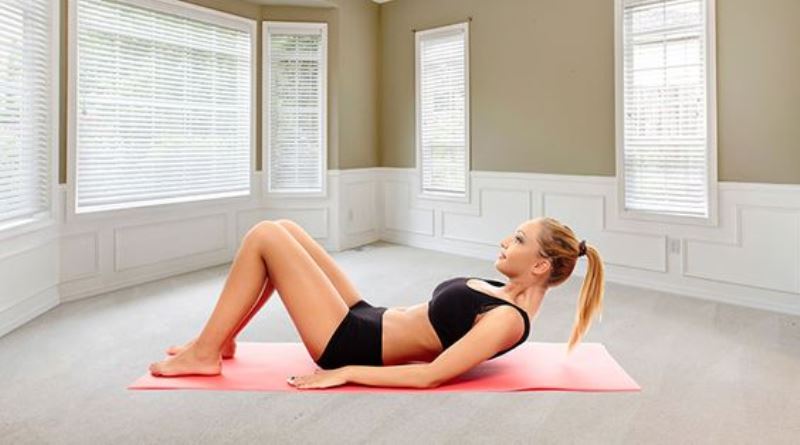
Image source: Pinterest
Working out for half an hour every day automatically makes you feel better about yourself. Your body gets flooded with endorphins and that is the reason why you feel so happy.
According to a study, increasing the body heat through exercise changes neural circuits which control our cognitive function causing a change in our mood.
The Mayo Clinic says,
“Keep physically active. Develop a routine so that you’re physically active most days of the week. Exercise is a powerful stress reducer. It may improve your mood and help you stay healthy. Start out slowly and gradually increase the amount and intensity of your activities.”
According to the New York Times,
Exercise in combination with stress management techniques is extremely important for many reasons. Exercise is an effective distraction from stressful events. Exercise may directly blunt the harmful effects of stress on blood pressure and the heart (exercise protects the heart).
Vary the exercise program, combining aerobic exercise with strength training. Start slowly. Strenuous exercise in people who are not used to it can be very dangerous. In addition, half of all people who begin a vigorous training program drop out within a year. Discuss any exercise program with a physician before starting. The key is to find activities that are exciting, challenging, and satisfying.”
So every day despite how busy you may be, take out half an hour for your own self and sweat it all out.
7. Epsom salts
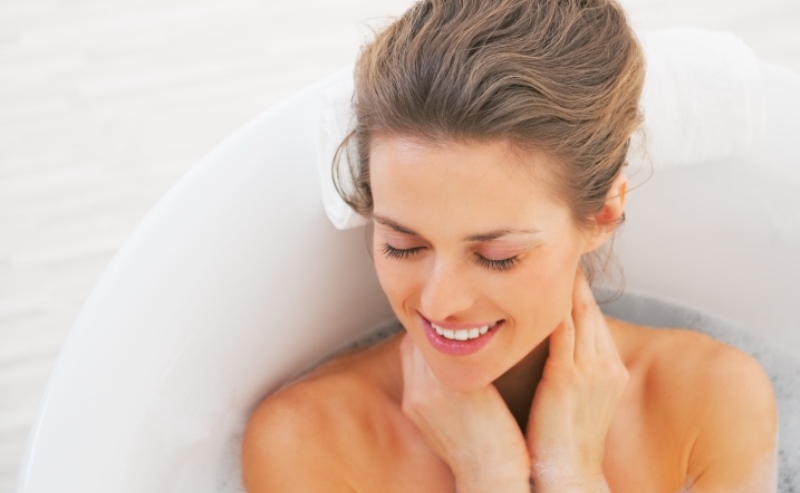
Image source: Shutterstock
A hot bath with Epsom salts can really help with anxiety.
A bath, in general, is calming and it raises the body heat which changes the mood and helps control anxiety. When you draw yourself a bath, add two cups of Epsom salts in it, for added benefits.
Epsom salts contain magnesium sulfates which lower your systolic pressure and thus calm your anxiety.
Apart from Epsom salts, you can also try vanilla essential oils for your bath. The scent soothes you senses, relieving you of anxiety.
8. Lower the caffeine intake

Image source: Pinterest
Caffeine increase our energy levels which causes our brain to never stop functioning. Also it wreaks havoc on the sleeping patterns.
By reducing your coffee intake to one cup a day, you will see changes within a few weeks.
You can even consider changing your beverage to something that has less caffeine and is health-wise a better choice. Think hot chocolate, soda, green tea etc.
Suggested read: 12 soothing tips on how to calm your overactive and stressed mind that actually work
That is all we have on home remedies for anxiety today.
Let us know if you have some doubts and let us know in the comment section, and we will get back to you immediately.
See you again tomorrow with a new set of home remedies.
Until then!
Featured image source: Google, copyright-free image under Creative Commons License




